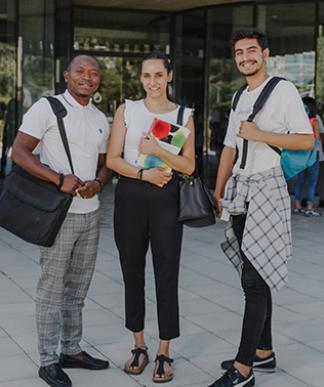


About the Program
Our Ph.D. program aims to teach students the analysis and exploration of the changing structure of international relations in a theoretical and comprehensive manner. Ph.D. students are provided with the necessary tools enabling them to develop analytical and critical skills. Essential aims of our program are; ensuring careers in public and private institutions, and supporting the academic and scientific studies on international relations in our university and in North Cyprus. Our program adopts a comprehensive approach and includes debates on theoretical issues. The curriculum is regularly updated and adapted to the changing structure of global international relations education system to fulfil the expectations and requirements of our university.
Education Opportunities
Ph.D. in International Relations program is comprised of advanced elective courses for graduate students to specialize in. The courses are given in advanced fields such as international relations theory, security issues, political economy, Middle East, political philosophy, comparative cultural analysis, conflict and conflict studies, and the like. Upon successful completion of the courses, students take a "scientific qualification examination". This examination consists of two steps: Written and oral. The written exam consists of three different areas from the field of international relations and the oral exam reassesses students’ analytical performance in those areas. Those who succeed in the exam proceed to the Ph.D. thesis writing stage and after the approval of the thesis proposal, they attend the Ph.D. supervision juries at the end of each semester. In accordance with the regulations of our university; students, prior to their thesis defense jury, have to publish an article, related to their thesis topic, in a journal indexed in SSCI, AHCI, SCI or SCI expanded.

Career Areas
The Department of International Relations aims to train students to not only become experts in their chosen field, but also be able to work with an international vision. In short, using their ability and background students will be able to put their theoretical and professional knowledge into practice in organizations such as:
International and National Organizations (United Nations, European Union, IMF, etc.);
Public Institutions;
Multinational Companies;
Visual and Printed Press;
Non- Profit Organizations;
Universities;
Ministry of Foreign Affairs;
International relations branches of national, international and global institutions also employ our graduates.
Contact
Institute of Graduate Studies and Research
Graduate Sciences and Education Center, GE106
Tel: +90 392 671 1111 Extension: 2776
Institute E-mail: ciu-institute@ciu.edu.tr
Compulsory Courses
First Semester
ELECTIVE I
Course code
INRE6X1Credit
3Theoretical
3Practical
0Ects
8ELECTIVE II
Course code
INRE6X2Credit
3Theoretical
3Practical
0Ects
8ELECTIVE III
Course code
INRE6X3Credit
3Theoretical
3Practical
0Ects
8ELECTIVE IV
Course code
INRE6X4Credit
3Theoretical
3Practical
0Ects
8ELECTIVE V
Course code
INRE6X5Credit
3Theoretical
3Practical
0Ects
8ELECTIVE VI
Course code
INRE6X6Credit
3Theoretical
3Practical
0Ects
8Second Semester
THESIS
Course code
INRE600Credit
0Theoretical
0Practical
0Ects
160QUALIFICATION EXAM
Course code
INRE650Credit
0Theoretical
0Practical
0Ects
20SEMINAR
Course code
INRE690Credit
0Theoretical
0Practical
0Ects
4Philosophy of Science
Course code
PHIL601Credit
3Theoretical
3Practical
0Ects
8Elective Courses
ETHNIC CONFLICT
Course code
INRE624Credit
3Theoretical
3Practical
0Ects
FOREIGN POLICY ANALYSIS
Course code
INRE602Credit
3Theoretical
3Practical
0Ects
MIDDLE EAST IN WORLD AFFAIRS
Course code
INRE604Credit
3Theoretical
3Practical
0Ects
ADVANCED THEORIES OF INTERNATIONAL RELATIONS
Course code
INRE601Credit
3Theoretical
3Practical
0Ects
GLOBAL GOVERNANCE
Course code
INRE610Credit
3Theoretical
3Practical
0Ects
SELECTED ISSUES IN POLITICS OF CYPRUS
Course code
INRE666Credit
3Theoretical
3Practical
0Ects
ISSUES IN EURO - MED POLITICS
Course code
INRE635Credit
3Theoretical
3Practical
0Ects
PHILOSOPHY AND GLOBALIZATION
Course code
INRE621Credit
3Theoretical
3Practical
0Ects
8THEORIES AND ISSUES IN GLOBAL SECURITY
Course code
INRE603Credit
3Theoretical
3Practical
0Ects
ACTUALITIES IN INTERNATIONAL PUBLIC LAW
Course code
INRE612Credit
3Theoretical
3Practical
0Ects
8CRITICAL THEORY
Course code
COMM610Credit
3Theoretical
3Practical
0Ects
10POLITICAL COMMUNICATION AND PROPAGANDA
Course code
COMM614Credit
3Theoretical
3Practical
0Ects
10THEORIES OF INTERNATIONAL RELATIONS
Course code
INRE501Credit
0Theoretical
0Practical
0Ects
COMPARING WORLD POLITICAL CULTURES
Course code
INRE622Credit
3Theoretical
3Practical
0Ects
8GLOBAL MEDIA AND CONFLICT
Course code
INRE626Credit
3Theoretical
3Practical
0Ects
GLOBAL POLITICAL ECONOMY
Course code
INRE634Credit
3Theoretical
3Practical
0Ects
PROBLEMS IN INTERNATIONAL SECURITY
Course code
INRE503Credit
0Theoretical
0Practical
0Ects
Philosophy of Science
Course code
PHIL601Credit
3Theoretical
3Practical
0Ects
8DOCUMENTARY FILM AND TELEVISION
Course code
COMM622Credit
3Theoretical
3Practical
0Ects
10ISSUES IN EUROPEAN INTEGRATION
Course code
INRE502Credit
3Theoretical
3Practical
0Ects
8INTRODUCTION TO WORLD POLITICS
Course code
INRE104Credit
0Theoretical
0Practical
0Ects
GLOBALIZATION AND INTERNATIONAL POLITICAL ECONOMY
Course code
INRE525Credit
3Theoretical
3Practical
0Ects
INTRODUCTION TO POLITICAL SCIENCE
Course code
INRE101Credit
0Theoretical
0Practical
0Ects
INTERNATIONAL ORGANIZATIONS AND GLOBALIZATION
Course code
INRE548Credit
3Theoretical
3Practical
0Ects
MEDIA HISTORY:TEXTS AND CONTEXTS
Course code
COMM532Credit
3Theoretical
3Practical
0Ects
10POLITICS OF PEACE AND CONFLICT IN DEEPLY DIVIDED SOCIETIES
Course code
INRE562Credit
3Theoretical
3Practical
0Ects
THEORIES OF INTERNATIONAL RELATIONS
Course code
INRE501Credit
3Theoretical
3Practical
0Ects
MIDDLE EAST IN WORLD AFFAIRS
Course code
INRE556Credit
3Theoretical
3Practical
0Ects
8THEORIES OF COMMUNICATION
Course code
COMM505Credit
3Theoretical
3Practical
0Ects
10CURRENT WORLD EVENTS
Course code
INRE534Credit
3Theoretical
3Practical
0Ects
RESEARCH METHODS
Course code
BUSN515Credit
3Theoretical
3Practical
0Ects
8QUALITATIVE AND QUANTITATE
Course code
INRE636Credit
3Theoretical
3Practical
0Ects
MARKETING STRATEGIES
Course code
BUSN532Credit
3Theoretical
3Practical
0Ects
8DEMOCRATIZATION AND THE CIVIL SOCIETY IN THE MIDDLE EAST
Course code
INRE560Credit
3Theoretical
3Practical
0Ects
ISSUES IN EURO-MEDITERRANEAN POLITICS
Course code
INRE535Credit
3Theoretical
3Practical
0Ects
USES OF MEDIA IN POLITICAL COMMUNICATION
Course code
COMM504Credit
3Theoretical
3Practical
0Ects
10CASES IN BUSINESS ETHICS
Course code
BUSN618Credit
3Theoretical
3Practical
0Ects
THE POLITICS OF MEDIA REPRESENTATION
Course code
COMM623Credit
3Theoretical
3Practical
0Ects
10FILM AESTHETICS
Course code
COMM513Credit
3Theoretical
3Practical
0Ects
10ENTREPRENEURSHIP
Course code
BUSN538Credit
3Theoretical
3Practical
0Ects
LANGUAGE OF SCIENCE AND CRITICAL EVALUATION
Course code
BUSN519Credit
3Theoretical
3Practical
0Ects
8MANAGERIAL DECISION MAKING AND GAME THEORY
Course code
BUSN629Credit
3Theoretical
3Practical
0Ects
HISTORY OF INTERNATIONAL RELATIONS I
Course code
INRE201Credit
0Theoretical
0Practical
0Ects
Students who are interested in pursuing advanced graduate studies leading to a master’s, doctoral degree or professional doctorate degree for the Fall and Spring semesters every year. Applicants can directly apply online to our graduate programs using the application portal.
TRNC Applicants- Required documents:
- Bachelor’s and Master’s Degree Diploma
- Bachelor’s and Master’s Degree transcripts for each completed academic term/year.
- Documents to prove English proficiency for English language departments,
- Scanned copy of passport or identity card.
Click for detailed admission requirements information.
Students who are interested in pursuing advanced graduate studies leading to a master’s, doctoral degree, or professional doctorate degree for the Fall and Spring semesters every year. Applicants can directly apply online to our graduate programs using the application portal.
International Applicants- Required documents:
- A valid Bachelor’s Degree and transcripts for each completed academic term/year.
- A valid Master’s Degree and transcripts for each completed academic term/year.
- Evidence of English Language competence: TOEFL (65 IBT) or IELTS (5.5). Students without these documents will take the CIU English proficiency exam on campus following arrival.
- Scanned copy of international passport/birth certificate
- CV
- Ph.D. research proposal
- Fully completed and signed CIU Rules and Regulations document (which can be downloaded during the online application)
Click for detailed admission requirements information.
Cyprus International University provides academic scholarships for its students as an incentive for success, with most students benefiting from 50%, 75% or 100% scholarships or discounted tuition fees. Click for more information.
Tuition Fees are determined at the beginning of each academic year. Candidate students who are entitled to enroll in CIU can learn their fees in line with the Tuition Fee Calculation system.